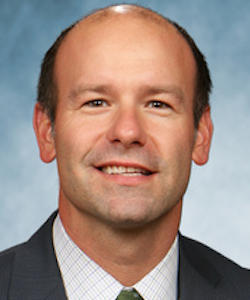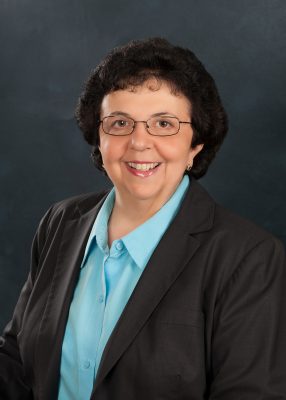An example of Syracuse University School of Education’s extensive collaboration with regional school districts, The Study Council’s 2021-2022 CNY Book Study wrapped up on May 18.
This year’s book—Five Practices for Equity-Focused School Leadership (ASCD, 2021), co-authored by Professor George Theoharis—was a timely choice: “So many districts are addressing barriers to learning in their strategic goals, it was a good time to offer this to member districts,” says Leela George, SOE Professor and and Executive Director of The Study Council.
The Right Thing to Do

Deputy Superintendent Joseph DeBarbieri of the Baldwinsville Central School District represents one of 24 Central New York school districts involved in the yearlong book study initiative, which meets online. DeBarbieri, a student in SOE’s Ed.D. in Educational Leadership program, offers three reasons for his decision to enroll himself as well as 30 of his district’s administrators.
First, after Theoharis shared his new book with his doctoral students, DeBarbieri says he purchased it for his administration team and began a district-wide equity audit, one of the practical steps toward equity-focused leadership the book’s co-authors suggest.
“We saw inequities at Baldwinsville, such as student access to accelerated programs,” says DeBarbieri. “There are no students of color in these programs despite our open enrollment practice, and we began asking, ‘Why is there no participation now when there has been in the past?'”
DeBarbieri also notes that the Baldwinsville CSD Board of Education required administrators to conduct equity audits as they relate to board goals: “This solidified our need to do the book study with our administrators.”
Moreover, NYSED’s call to action was, in DeBarbieri’s words, “the right thing to do.” “All students should be given opportunities and access to engage in instruction that meets their needs. NYSED’s culturally responsive framework is all about how students see themselves in the curriculum and instruction.”
Moving in the Same Direction
During 2021-2022 CNY Book Study meetings, Professor Theoharis typically began with an overview of one of the five practices of equity-focused school leadership outlined in his book, offering his own perspectives, data, and anecdotes. Then the 232-strong study group split into district-level teams to reflect on the ideas. “Sometimes the participants were divided into small mixed groups so districts can hear from each other,” explains George.
“There’s a benefit of having multiple school districts involved,” adds DeBarbieri. “It helps us see what other districts are doing.” Plus, he says, a region-wide effort is critical “because progress can get stunted in a smaller setting. You need a lot of people moving in the same direction in order to change practices.”
“Our effort is about educating the community and our staff about what equity means.”
Specifically, DeBarbieri says Baldwinsville CSD is investigating the representation of its populations in various programs, such as fine arts, athletics, and accelerated coursework, as well as disproportional representation of minority populations in disciplinary matters.
While DeBarbieri admits that the current national political climate—parent-activists protesting school board meetings, book banning, and so-called “Don’t Say Gay” state laws—is not conducive to this work, “Our effort is about educating the community and our staff about what equity means. It’s not hard to advocate for change once you see the data. We’re getting people up to speed that we are not the same school district as we were 10 years ago.”
A Multi-Perspective Lens

The need to educate stakeholders about equitable and inclusive education is part of what inspired Superintendent Donna DeSiato G’04—2021-2021 New York State Superintendent of the Year and President of The Study Council—to sign up a cross-organization leadership team from her East Syracuse-Minoa Central School District.
“It is our responsibility to educate students and the community so we can meet the learning and developmental needs of all our students, especially the social and emotional learning needs that have arisen because of the coronavirus pandemic,” says DeSiato, who holds an Ed.D. in Educational Leadership. “We need to look at all this through a multi-perspective lens, and this work helps us do that.”
DeSiato explains that studying the five practices of equity-focused school leadership during the CNY Book Study fit well with her district’s strategic planning efforts. “We were already looking at it through the lenses of disability, race, gender, sexual orientation, religion, and socio-economic status.”
“The book study has been a worthwhile endeavor,” DeSiato notes. “That includes the fact that we have time set aside for our team to meet and reflect on chapters and on how to apply meaningful lessons to our plan to keep it moving forward.”
DeBarbieri says that, in the wake of the CNY Book Study, he will encourage Baldwinsville building-level administrators to do similar work, including their own equity audits and development of equity leadership teams. “In order to sustain this transformative process, we need all stakeholders involved. Our work will grow exponentially with trained leaders going through the same process at the building level.”
“We need to look at all this through a multi-perspective lens, and this work helps us do that.”
Given the need for ongoing, transformational change across area school districts, Professor George says the equity leadership work will continue next academic year and may evolve into a follow-up Community of Practice Group.
This group will be a mutually supportive community to help put strategies from Five Practices for Equity-Focused School Leadership further into practice, by delving deeper into school equity data, assessing schools’ action plans, and, says George, “bringing in other voices from the districts, such as teachers and students.”
Learn more about Syracuse University School of Education’s Ed.D. in Educational Leadership or contact Professor George Theoharis.
